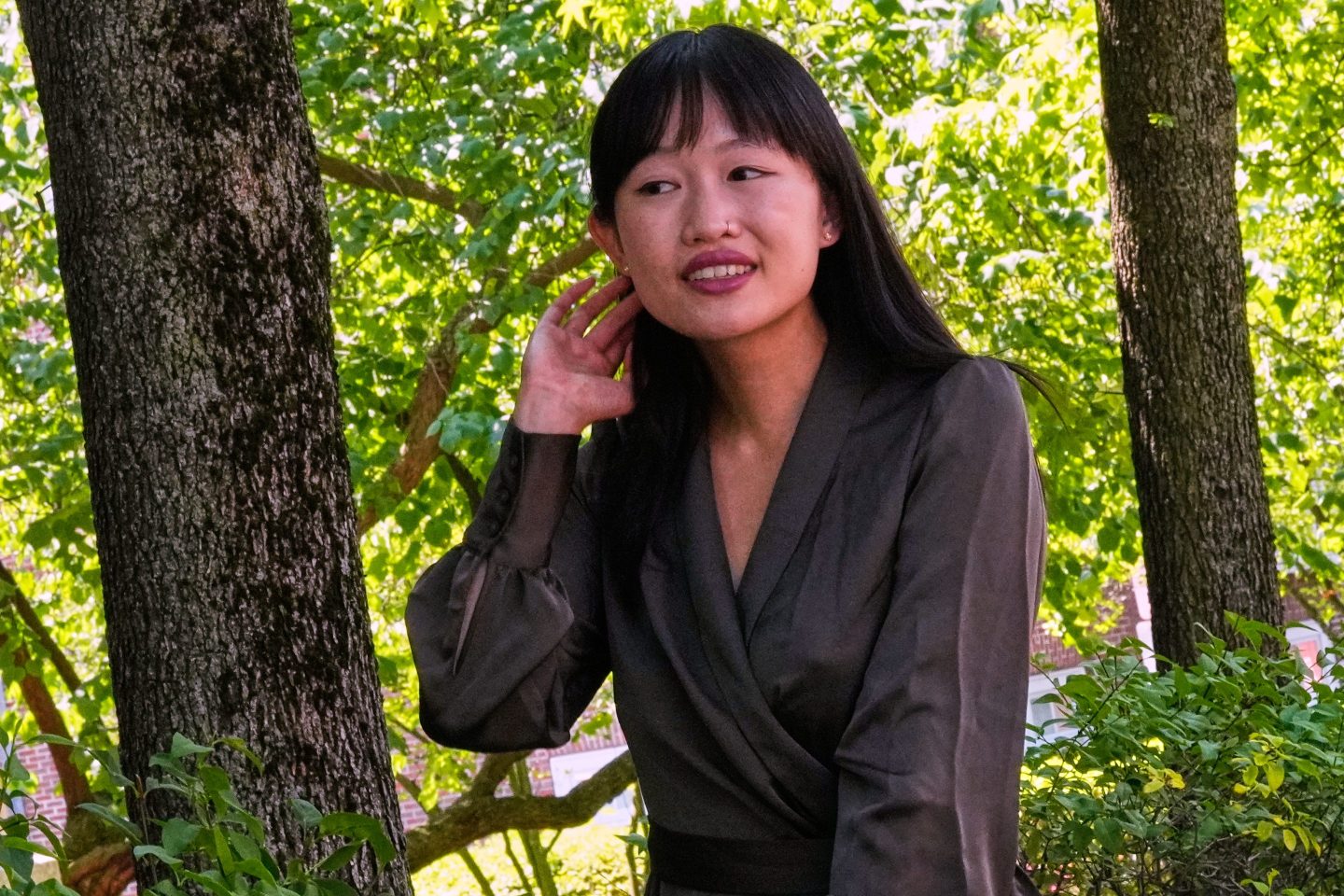For Rebecca F. Kuang, who has had six bestsellers before the age of 30, an eternal afterlife of leisure scares her more than the idea of going to hell.
“As a child, I was told when you die you go to heaven and heaven is where you eat cake all day and just get to hang out with your friends,” said the 29-year-old Chinese American novelist, who was raised Christian, and publishes as R.F. Kuang. “And this really, really disturbed me because I think the monotony of that eternal existence was really frightening. It seems like there could be no stakes, nothing would be precious because there would be no conception of time.”
Ruminating on what happens after you die inspired Kuang’s newest book, “Katabasis.” After the brilliant satire of publishing and social media in 2023’s “Yellowface,” Kuang returns to the fantasy genre.
Not unlike 2022’s “Babel,” “Katabasis,” out Tuesday, is a dark yet playful takeoff on academia — a setting the current Yale University graduate student knows well. It’s been the talk of BookTok and on publications’ most-anticipated book lists, and there are already plans to turn it into an Amazon series led by “The Walking Dead” showrunner Angela Kang. Kuang will serve as a producer.
Kuang, though, tries not to let pressure and high expectations get to her.
“I think I always get a little bit nervous before a book comes out, but I think it’s just not good to dwell on that because it’s not productive at all,” said Kuang, who already had several chapters of “Katabasis” written by the time “Yellowface” came out.
The story’s protagonist, Cambridge analytic magick doctoral student Alice, is obsessed with getting that holiest of academic grails: a recommendation letter from the department chair. After he unexpectedly dies, Alice decides to use a pentagram to enter purgatory and track him down. Only a handful of scholars have survived the journey. Classmate and frenemy Peter invites himself along.
Like the nine circles of hell from “Dante’s Inferno,” readers get swept up in the “Eight Courts of Hell.” As the architect of hell, Kuang lays the landscape out in great detail, from vast dunes to skeletal animals made only of bones held together with chalk.
Kuang researched different beliefs about the underworld and wrote “Katabasis” all while continuing pursuit of her doctorate in East Asian languages and literature at Yale. She spoke with The Associated Press recently about the “magick” of designing her own version of hell and the Trump administration’s targeting of universities, among other topics. The interview has been edited for clarity and brevity.
AP: You must have had a lot of fun like designing each hell court. The Pride Court (a library) was a lot of people who had been very condescending or pretentious. Was that your own playful revenge for maybe sometimes annoying — be it well-intentioned — colleagues in academia?
KUANG: For sure, I — we had a lot of fun. I was bouncing ideas off my husband because he’s in academia as well. We were thinking about, “Oh, what are all the little annoying things that people do that couldn’t be properly called malicious but I think deserves a little bit of punishment in hell?”
AP: What made you settle on the time period of the 1980s?
KUANG: I just think the ’80s are very culturally fun for me. I’m a ’90s kid, so I just miss that. But I am also interested in the Reagan and Thatcher era. So I think the ’70s and ’80s are this period of backlash and the rise of neoliberalism and privatization against the sort of cultural advances that had been made during the ’60s. So in the ’60s, you have the civil rights era and then the ’70s and ’80s, you have the rolling back of a lot of those egalitarian movements.
I wanted my characters to be working in a space where it feels like there’s this widespread denial about the existence of structural oppression — and they are really raised by this mentality that if things go wrong for them then it’s entirely their fault and they need to pull themselves up by their bootstraps, which is devastating because then they don’t have avenues for solidarity.
AP: I have to ask you about a line from the book: “On both sides of the Atlantic, the conservatives were several years in power and this meant funding cuts for universities, shrinking departments, vanishing opportunities.” Total coincidence?
KUANG: Yes, but I finished I finished revisions before the election. So, I think even in November, we had no idea what kind of attacks on higher education were going to come on in the following fall. So I wasn’t writing about this political moment, but it does seem like we’re right back in the ’80s.
AP: You’re very much steeped in that academic world right now. How are you processing this political moment?
KUANG: All I can do is just keep doing my work. Because I think the final victory would just be to roll over and play dead and let the administration stop us from pursuing the lines of research that we’ve been pursuing all along. And they can make it as difficult as they can, but we shouldn’t preemptively just put our pens down and walk away.
AP: You don’t really look at people’s BookTok videos either praising you or reviewing your book?
KUANG: The last time I was on TikTok was two years ago, and it was fun but it’s a massive distraction. I believe pretty firmly that TikTok should be a space for readers. It’s actually this wonderful thing that, like especially younger readers, can get so enthusiastic about books and share their opinions and recommend things like that. That’s really, really cool, especially at a time where things like reading is kind of under attack especially with book bans and all that.










